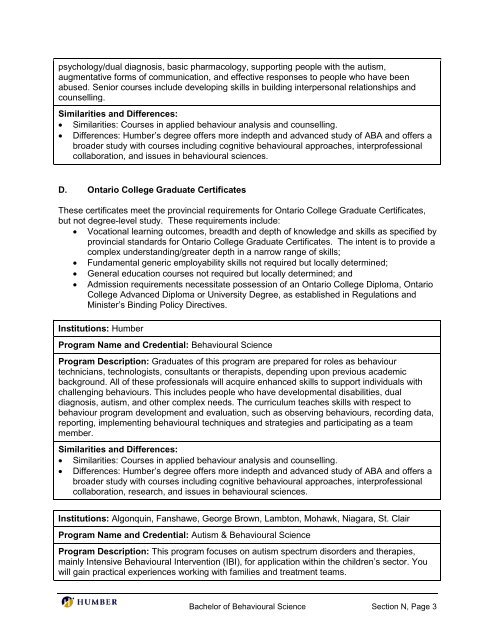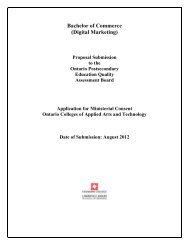Bachelor of Behavioural Science - Postsecondary Education Quality ...
Bachelor of Behavioural Science - Postsecondary Education Quality ...
Bachelor of Behavioural Science - Postsecondary Education Quality ...
You also want an ePaper? Increase the reach of your titles
YUMPU automatically turns print PDFs into web optimized ePapers that Google loves.
psychology/dual diagnosis, basic pharmacology, supporting people with the autism,<br />
augmentative forms <strong>of</strong> communication, and effective responses to people who have been<br />
abused. Senior courses include developing skills in building interpersonal relationships and<br />
counselling.<br />
Similarities and Differences:<br />
Similarities: Courses in applied behaviour analysis and counselling.<br />
Differences: Humber’s degree <strong>of</strong>fers more indepth and advanced study <strong>of</strong> ABA and <strong>of</strong>fers a<br />
broader study with courses including cognitive behavioural approaches, interpr<strong>of</strong>essional<br />
collaboration, and issues in behavioural sciences.<br />
D. Ontario College Graduate Certificates<br />
These certificates meet the provincial requirements for Ontario College Graduate Certificates,<br />
but not degree-level study. These requirements include:<br />
Vocational learning outcomes, breadth and depth <strong>of</strong> knowledge and skills as specified by<br />
provincial standards for Ontario College Graduate Certificates. The intent is to provide a<br />
complex understanding/greater depth in a narrow range <strong>of</strong> skills;<br />
Fundamental generic employability skills not required but locally determined;<br />
General education courses not required but locally determined; and<br />
Admission requirements necessitate possession <strong>of</strong> an Ontario College Diploma, Ontario<br />
College Advanced Diploma or University Degree, as established in Regulations and<br />
Minister’s Binding Policy Directives.<br />
Institutions: Humber<br />
Program Name and Credential: <strong>Behavioural</strong> <strong>Science</strong><br />
Program Description: Graduates <strong>of</strong> this program are prepared for roles as behaviour<br />
technicians, technologists, consultants or therapists, depending upon previous academic<br />
background. All <strong>of</strong> these pr<strong>of</strong>essionals will acquire enhanced skills to support individuals with<br />
challenging behaviours. This includes people who have developmental disabilities, dual<br />
diagnosis, autism, and other complex needs. The curriculum teaches skills with respect to<br />
behaviour program development and evaluation, such as observing behaviours, recording data,<br />
reporting, implementing behavioural techniques and strategies and participating as a team<br />
member.<br />
Similarities and Differences:<br />
Similarities: Courses in applied behaviour analysis and counselling.<br />
Differences: Humber’s degree <strong>of</strong>fers more indepth and advanced study <strong>of</strong> ABA and <strong>of</strong>fers a<br />
broader study with courses including cognitive behavioural approaches, interpr<strong>of</strong>essional<br />
collaboration, research, and issues in behavioural sciences.<br />
Institutions: Algonquin, Fanshawe, George Brown, Lambton, Mohawk, Niagara, St. Clair<br />
Program Name and Credential: Autism & <strong>Behavioural</strong> <strong>Science</strong><br />
Program Description: This program focuses on autism spectrum disorders and therapies,<br />
mainly Intensive <strong>Behavioural</strong> Intervention (IBI), for application within the children’s sector. You<br />
will gain practical experiences working with families and treatment teams.<br />
<strong>Bachelor</strong> <strong>of</strong> <strong>Behavioural</strong> <strong>Science</strong> Section N, Page 3
















